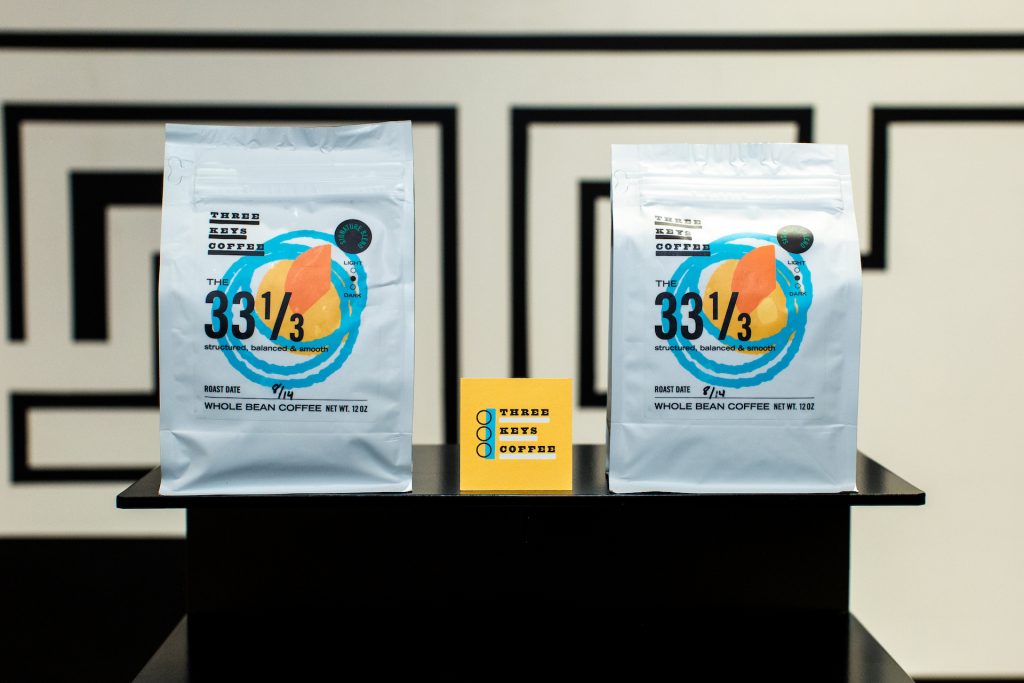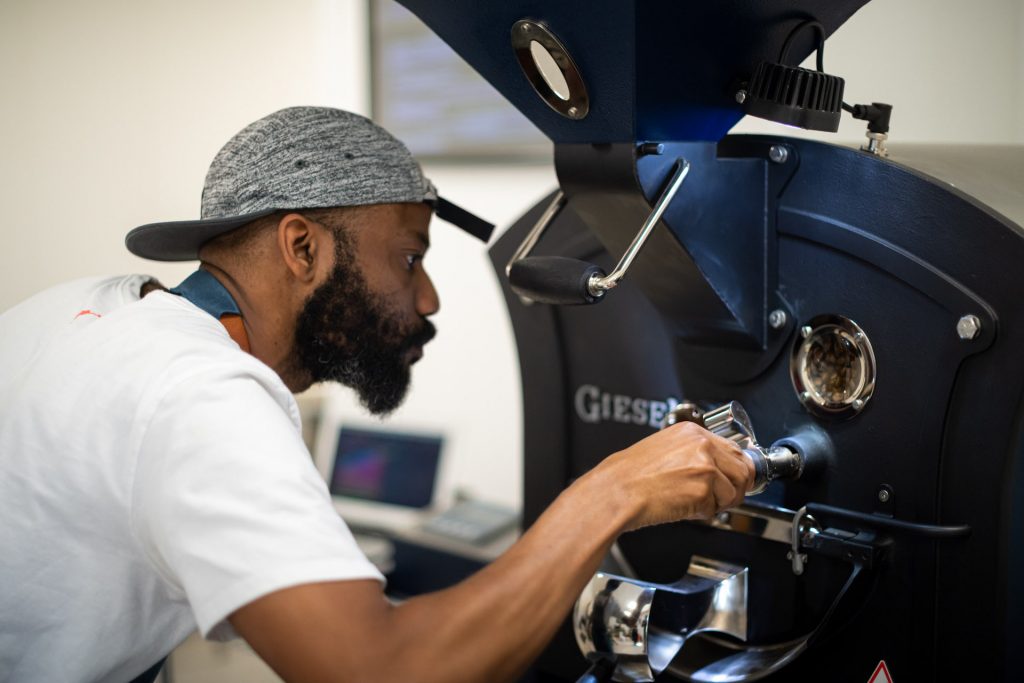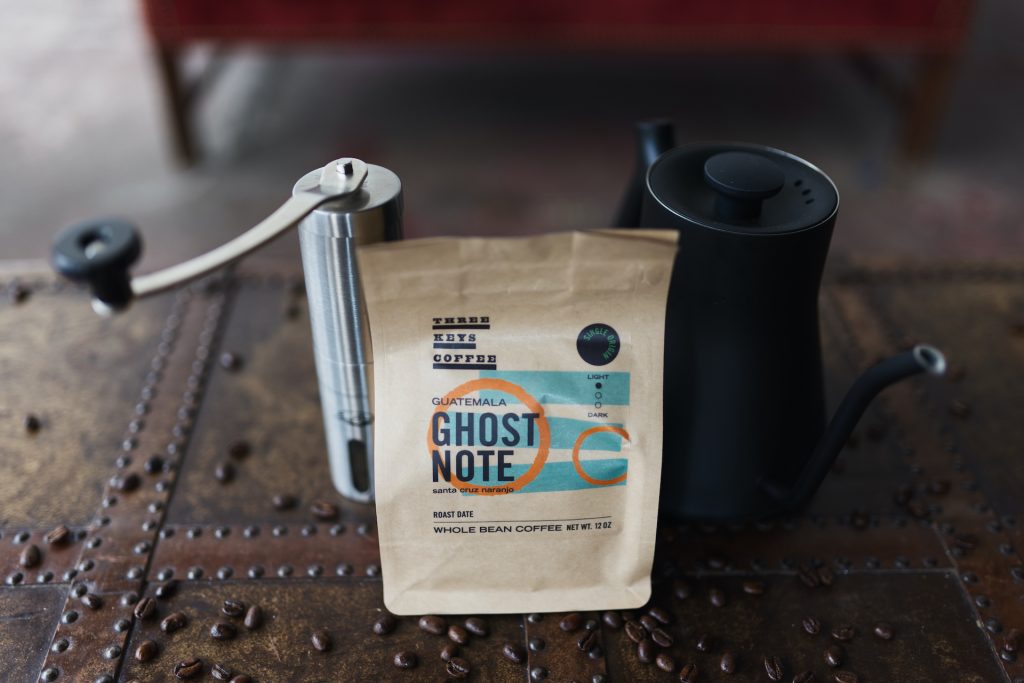Since the fall, Industrious members have been able to sample brews by coffee roasters from different regions each quarter as part of a new program aimed at supporting minority-owned businesses.
Houston’s Three Keys Coffee is one of the roasters whose beans are making their way into coffee cups at Industrious locations across the country this year. Husband-and-wife team Tio and Kenzel Fallen decided to start the roastery after visiting six coffee producing regions around the world. An avid traveler, Kenzel has been to nearly 30 countries. For Tio, a mechanical engineer by trade and trumpet player by calling, the roastery combines his interest in science with the artistic freedom he loves in jazz.
Read on to hear from Three Key Coffee’s founders — or head to Industrious’ Instagram Stories to learn more about their blends.
 You can now try Three Keys Roasters at Industrious locations across the country. (Aspen Jeanne Photography)
You can now try Three Keys Roasters at Industrious locations across the country. (Aspen Jeanne Photography)
How did Three Keys Coffee get its name?
Three Keys takes its inspiration from the sounds and art of jazz and specifically derives its name from the keys of the trumpet — an instrument of simplicity that uses just three keys to produce notes across a creative and complex range of tonal outputs.
Where do you source your beans from?
We find that the best beans come from importers who are both knowledgeable about the source regions and directly invested in elevating the people and communities who grow the coffee we all enjoy worldwide.
For example, we recently entered a partnership to source fair trade, organic Congolese coffee from Mighty Peace Coffee, an organization that upholds high labor standards, invests in environmental initiatives, and advocates for sustainable economic opportunity for the local population of the Democratic Republic of Congo.
How do you approach roasting and roast types ?
Developing the ideal roast profile for a bean can take days, weeks, or even months. We spend time first studying the origin of the beans we want to roast — factoring in variables such as elevation, topography, processing method, moisture content, and density — before determining how to approach roasting a particular bean.
Some beans (e.g. Central Americans) can work very well roasted as a light, medium, or dark roast. Other beans (e.g. Kenyan) are much more delicate and work better as a light/medium roast. It takes time, trial and error, and lots of cupping [tasting] to determine the best method to roast a particular bean.
 Settling on a roast profile requires extensive testing to understand the bean’s flavors and roasting beahviours. (Field of Study Design)
Settling on a roast profile requires extensive testing to understand the bean’s flavors and roasting beahviours. (Field of Study Design)
What sets Three Keys Coffee apart?
We are more than a coffee brand. We are a craft coffee roastery. We personally work with specialty importers to source the best raw coffee beans, spend countless hours experimenting with different roast profiles on a high-quality Giesen roasting machine, and always roast-to-order. So each bag of beans you receive from Three Keys Coffee was personally crafted just for your order by our co-founder, Tio, who conducts all roasting in-house.
Additionally, our coffee is a multi-sensory experience that explores the intersection of art, music (specifically jazz), and science. We explore the connection between these worlds through vibrant artwork designs on our product bags, curated Spotify playlists to accompany each roast, and top-quality crafted coffee.
Why do you love what you do?
Coffee roasting is an art and a science. It allows us to use both our creative abilities but also apply processes, math, and engineering concepts to explore our technical abilities. Essentially, it challenges us at all times to use both sides of our brain.
We also enjoy delivering a great product and a fun experience to customers. We once had someone tell us that she thought she didn’t like coffee but tried her first cup in 40 years (which was Three Keys Coffee) — loved it — and now she’s realizing how much she was missing out on. We also had someone tell us that he’s felt more productive at work listening to our playlists because it is “innovation” music and gets his creative juices flowing. These are the stories that keep us going and inspire us to continue delivering a great multi-sensory coffee experience.
How do you like to take your coffee?
Tio: Americano with Three Keys Coffee’s Guatemala Ghost Note.
Kenzel: Iced Oat Milk Latte with Three Keys Coffee’s The 33-1/3 LP – Signature Blend.
 Tio likes using Three Keys’ Ghost Note coffee to make Americanos. (John Bogna)
Tio likes using Three Keys’ Ghost Note coffee to make Americanos. (John Bogna)
When do you do your best work?
As the parents of two toddlers, we understand how limited and precious time is. We do much of our best work when we are in clean, bright, airy spaces, usually with some background music (jazz) playing. Whether it’s 5 am, 5 pm, or sometime in between, we can always find opportunities to focus in and become productive. Coffee certainly helps! 🙂
How do you believe coffee connects us?
Our hope is to make specialty coffee more inclusive and accessible to everyone in the way that jazz music was made more accessible to the masses.
Look at the history of vinyl recordings as an analogy; [they were] one of the first means of bringing aspects of a live music set/club into the home. This allowed wider audiences to listen and enjoy the sounds of the time. In turn, jazz was able to gain huge popularity.
We intend to do the same with our coffee. We hope to connect not only with the occasional consumer, but also the connoisseur. And with our accompanying playlists, we want to essentially bring the atmosphere of a coffee shop or jazz café to your workplace or home through our curated expressions.